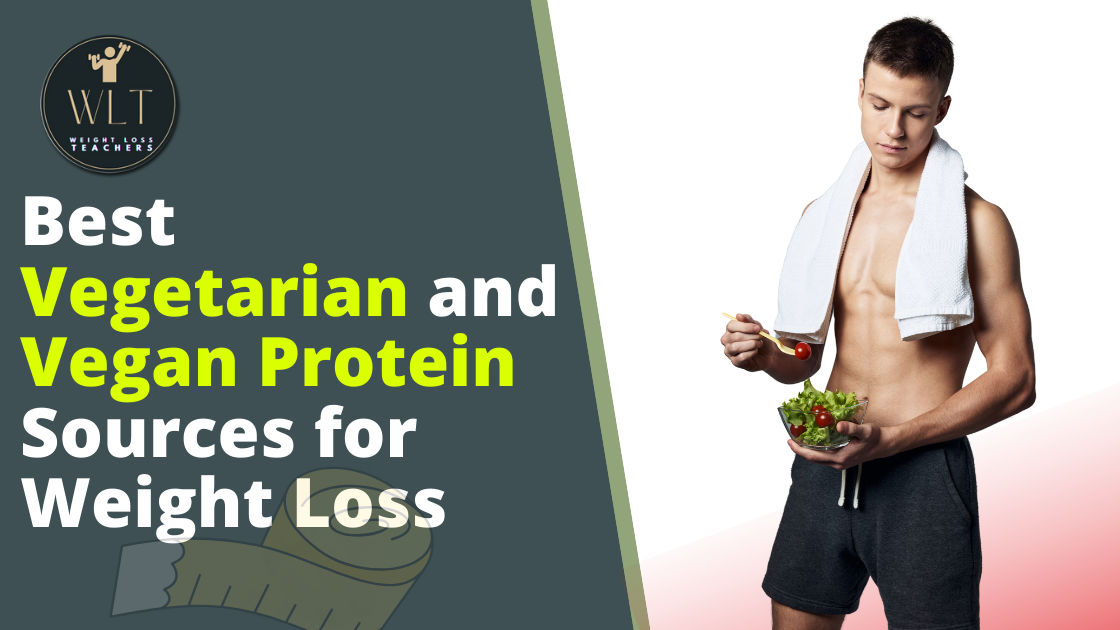
Best Vegetarian and Vegan Protein Sources for Weight Loss
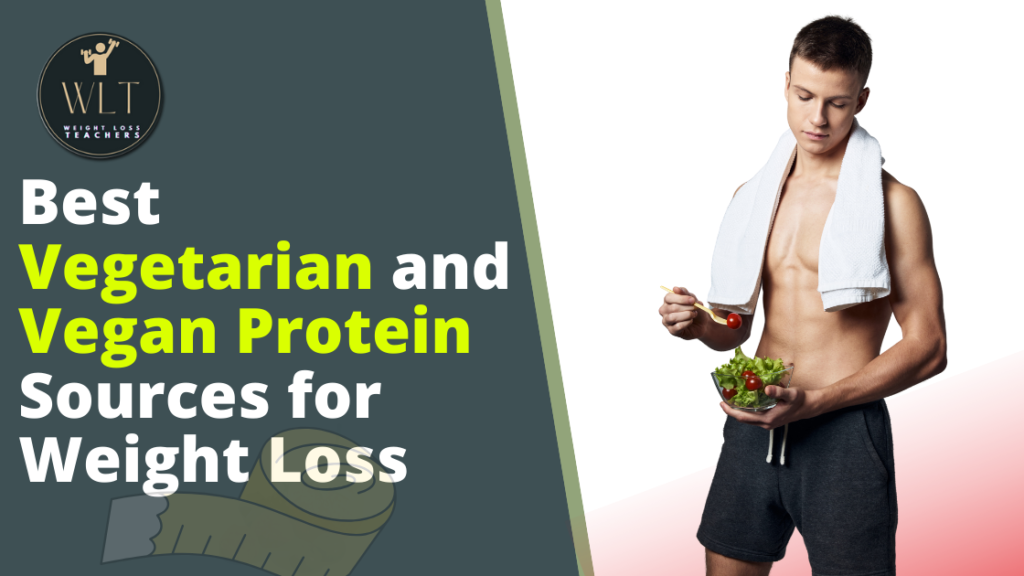
In recent years, there has been a growing interest in vegetarian and vegan diets, not only for ethical and environmental reasons but also for their potential health benefits, including weight loss.
Table of Contents
Introduction
Contrary to the misconception that plant-based diets lack protein, there are abundant sources of high-quality protein for those looking to shed pounds while following a vegetarian or vegan lifestyle. In this comprehensive guide, we will explore the best vegetarian and vegan protein sources for weight loss, offering insights into their nutritional value, health benefits, and practical tips for incorporating them into your diet.

Understanding the Role of Protein in Weight Loss
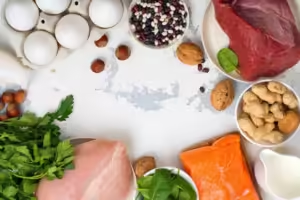
Before delving into specific protein sources, it’s essential to understand why protein is crucial for weight loss. Protein plays a pivotal role in several aspects of weight management, making it an indispensable component of any successful weight loss plan:
- Satiety: Protein is highly satiating, meaning it helps you feel full and satisfied after a meal. This reduces the likelihood of overeating and snacking between meals, which can lead to weight gain.
- Muscle Preservation: During weight loss, the body tends to break down not only fat but also lean muscle tissue. A sufficient protein intake can help preserve lean muscle mass, ensuring that the majority of weight lost comes from fat stores.
- Thermogenesis: The thermic effect of food (TEF) is the energy expenditure required to digest, absorb, and metabolize the nutrients in your food. Protein has the highest TEF of all macronutrients, meaning it burns more calories during digestion compared to fats and carbohydrates.
- Blood Sugar Regulation: Protein can help stabilize blood sugar levels, preventing spikes and crashes that can lead to cravings and overeating.
- Metabolic Boost: Adequate protein intake may boost your metabolic rate, allowing you to burn more calories at rest.
Best Vegetarian and Vegan Protein Sources for Weight Loss
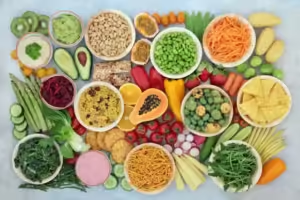
Now that we understand the importance of protein in a weight loss journey, let’s explore the best vegetarian and vegan sources of this essential nutrient.
3.1 Legumes
Legumes are a diverse group of plants that include beans, lentils, chickpeas, and peas. They are not only rich in protein but also fiber, making them an excellent choice for weight loss.
Nutritional Profile:
- Protein Content: On average, legumes contain about 15-20% protein by weight, making them one of the best plant-based protein sources.
- Fiber: Legumes are also high in dietary fiber, which aids in satiety and digestive health.
- Complex Carbohydrates: They provide slow-digesting, complex carbohydrates that help maintain steady energy levels.
- Vitamins and Minerals: Legumes are rich in essential vitamins and minerals, including iron, folate, and potassium.
Health Benefits:
- Weight Loss: Legumes promote feelings of fullness and can help reduce overall calorie intake.
- Heart Health: Their fiber content supports heart health by lowering cholesterol levels.
- Digestive Health: The fiber in legumes aids in regular bowel movements and may reduce the risk of digestive disorders.
- Blood Sugar Control: Legumes have a low glycemic index, helping to stabilize blood sugar levels.
Incorporation into Your Diet:
- Hummus: Make a delicious dip or spread with chickpeas, tahini, lemon juice, and garlic.
- Bean Salads: Create colorful salads with a variety of beans, veggies, and your favorite dressing.
- Lentil Soup: Prepare a hearty and nutritious lentil soup with vegetables and spices.
- Black Bean Tacos: Replace meat with seasoned black beans for a protein-packed taco filling.
3.2 Tofu and Tempeh
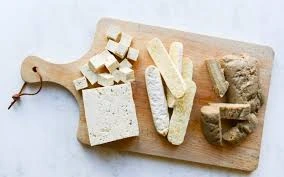
Tofu and tempeh are soy-based protein sources that have been staples in Asian cuisine for centuries. They are versatile, protein-rich foods suitable for various cooking methods.
Nutritional Profile:
- Tofu: Tofu contains about 8-10 grams of protein per 3.5 ounces (100 grams). It’s also a source of calcium, iron, and essential amino acids.
- Tempeh: Tempeh is more protein-dense, with around 19 grams of protein per 3.5 ounces (100 grams). It is also a good source of probiotics, fiber, and vitamins like B12.
Health Benefits:
- Muscle Growth: The amino acids in soy-based proteins are similar to those in animal proteins, making them valuable for muscle growth and repair.
- Bone Health: Tofu is rich in calcium, which is essential for bone health, especially for those on a vegan diet.
- Digestive Health: Tempeh’s probiotics support gut health and digestion.
- Cholesterol Management: Both tofu and tempeh may help lower bad cholesterol levels when included in a balanced diet.
Incorporation into Your Diet:
- Stir-Fry: Add tofu or tempeh to your favorite stir-fry recipe for a protein boost.
- Tofu Scramble: Create a vegan scramble by crumbling tofu and seasoning it with spices, veggies, and nutritional yeast.
- Grilled Tempeh: Marinate tempeh and grill it for a savory, meaty texture.
- Tofu Smoothies: Blend silken tofu into your morning smoothie for added creaminess and protein.
3.3 Seitan
Seitan, also known as wheat gluten or wheat meat, is a high-protein, meat substitute made from gluten, the protein component of wheat. It’s an excellent choice for individuals looking to increase their protein intake while keeping carbohydrates low.
Nutritional Profile:
- Protein Content: Seitan is incredibly protein-dense, containing approximately 25 grams of protein per 3.5 ounces (100 grams).
- Low in Carbs: It’s virtually carb-free, making it suitable for low-carb diets.
- Iron: Seitan provides a good amount of iron, a nutrient often lacking in vegan diets.
Health Benefits:
- Weight Management: Seitan’s low-calorie content and high protein content make it beneficial for weight loss.
- Muscle Building: With a protein content similar to that of meat, seitan supports muscle growth and repair.
- Iron Absorption: The iron in seitan is non-heme iron, which is better absorbed when consumed with vitamin C-rich foods.
Incorporation into Your Diet:
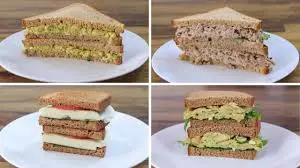
- Stir-Fry: Use seitan as a meat substitute in stir-fries or noodle dishes.
- Sandwiches: Make a hearty sandwich or wrap by adding sliced seitan with your favorite veggies and condiments.
- Grilled Skewers: Marinate and grill seitan chunks on skewers for a satisfying barbecue alternative.
- Seitan Sausages: Create your own seitan sausages with herbs and spices for a tasty and protein-packed breakfast option.
3.4 Nuts and Seeds
Nuts and seeds are not only a source of healthy fats but also provide a moderate amount of protein, making them valuable additions to a weight loss diet.
Nutritional Profile:
- Protein Content: Nuts and seeds typically contain around 5-8 grams of protein per ounce (28 grams).
- Healthy Fats: They are rich in monounsaturated and polyunsaturated fats, which can help reduce cravings and promote satiety.
- Fiber: Nuts and seeds are also high in dietary fiber, aiding in digestion and appetite control.
- Vitamins and Minerals: They provide essential nutrients such as vitamin E, magnesium, and zinc.
Health Benefits:
- Heart Health: Nuts and seeds support heart health by reducing bad cholesterol levels and promoting good cholesterol.
- Anti-Inflammatory: Their high content of antioxidants can help reduce inflammation in the body.
- Brain Health: The healthy fats in nuts and seeds support cognitive function.
- Weight Management: Despite being calorie-dense, the combination of protein, fiber, and healthy fats in nuts and seeds can contribute to weight loss when consumed in moderation.
Incorporation into Your Diet:
- Nut Butter: Spread almond, peanut, or cashew butter on whole-grain toast or fruit slices.
- Trail Mix: Create your own trail mix with a variety of nuts, seeds, and dried fruits for a portable snack.
- Salads: Sprinkle chopped nuts or seeds on salads for added texture and flavor.
- Smoothies: Blend a tablespoon of chia seeds or flaxseeds into your morning smoothie for an omega-3 boost.
3.5 Quinoa

Quinoa is often hailed as a superfood due to its exceptional nutritional profile. It’s a complete protein, meaning it contains all nine essential amino acids, making it an ideal choice for vegetarians and vegans.
Nutritional Profile:
- Protein Content: Quinoa contains about 8 grams of protein per cup (185 grams) when cooked.
- Fiber: It’s also a good source of dietary fiber, promoting feelings of fullness and aiding digestion.
- Micronutrients: Quinoa is rich in vitamins and minerals, including magnesium, phosphorus, and folate.
Health Benefits:
- Complete Protein: Quinoa’s amino acid profile is similar to that of animal proteins, making it a valuable protein source for vegans.
- Weight Loss: Its protein and fiber content contribute to reduced calorie intake and better appetite control.
- Gluten-Free: Quinoa is naturally gluten-free, making it suitable for those with gluten sensitivity or celiac disease.
Incorporation into Your Diet:
- Quinoa Bowl: Create a quinoa bowl with your choice of vegetables, beans, and a flavorful dressing.
- Quinoa Salad: Make a refreshing salad with quinoa, cucumber, cherry tomatoes, and fresh herbs.
- Stuffed Peppers: Use quinoa as a stuffing for bell peppers for a protein-rich, meatless meal.
- Breakfast Porridge: Cook quinoa with almond milk and sweeten it with fruits and honey for a nutritious breakfast option.
3.6 Spirulina
Spirulina is a blue-green algae that is exceptionally nutrient-dense and a fantastic source of plant-based protein. Although it is not a staple in most diets, it can be a beneficial addition for those seeking to boost their protein intake.
Nutritional Profile:
- Protein Content: Spirulina contains an impressive 60-70% protein by weight, making it one of the most protein-dense foods on the planet.
- Vitamins and Minerals: It’s rich in vitamins like B12, iron, and essential fatty acids.
- Chlorophyll: Spirulina’s vibrant green color comes from chlorophyll, which may have detoxifying effects.
Health Benefits:
- Protein Packed: Spirulina’s protein content is unmatched among plant-based sources.
- Immune Support: It may help boost the immune system due to its rich nutrient profile.
- Antioxidant Properties: Spirulina contains potent antioxidants that can combat oxidative stress and inflammation.
- Detoxification: Chlorophyll in spirulina may aid in detoxifying the body by binding to heavy metals.
Incorporation into Your Diet:
- Smoothies: Add a teaspoon of spirulina powder to your green smoothies for a protein and nutrient boost.
- Energy Balls: Mix spirulina into homemade energy balls or protein bars.
- Salad Dressing: Create a unique salad dressing by combining spirulina with olive oil, lemon juice, and your choice of herbs.
- Capsules or Tablets: If the taste is unpalatable, spirulina is available in capsule or tablet form for easy consumption.
3.7 Edamame
Edamame, young soybeans still in their pods, is a popular snack and appetizer in many Asian cuisines. They are not only delicious but also a rich source of plant-based protein.
Nutritional Profile:
- Protein Content: Edamame contains about 17 grams of protein per cup (155 grams) when cooked.
- Fiber: They are also a good source of dietary fiber.
- Vitamins and Minerals: Edamame provides essential nutrients such as folate, vitamin K, and manganese.
Health Benefits:
- Protein and Fiber Combo: The combination of protein and fiber in edamame promotes feelings of fullness and aids in weight management.
- Bone Health: The vitamin K in edamame supports bone health and may reduce the risk of osteoporosis.
- Plant Compounds: Edamame contains plant compounds like isoflavones, which have been linked to various health benefits, including hormonal balance.
Incorporation into Your Diet:
- Steamed Edamame: Simply steam edamame and sprinkle with sea salt for a nutritious snack.
- Edamame Hummus: Create a protein-rich hummus by blending cooked edamame with tahini, garlic, and lemon juice.
- Stir-Fry: Add edamame to vegetable stir-fries for an extra protein boost.
- Edamame Salad: Toss cooked edamame with cherry tomatoes, corn, and a vinaigrette dressing for a refreshing salad.
3.8 Chia Seeds
Chia seeds are tiny nutritional powerhouses packed with protein, fiber, and essential fatty acids. They have gained popularity in recent years due to their numerous health benefits.
Nutritional Profile:
- Protein Content: Chia seeds contain about 4 grams of protein per 2 tablespoons (28 grams).
- Fiber: They are an excellent source of soluble and insoluble fiber, aiding in digestion and promoting satiety.
- Omega-3 Fatty Acids: Chia seeds are rich in alpha-linolenic acid (ALA), a type of omega-3 fatty acid.
- Vitamins and Minerals: They provide essential nutrients such as calcium, magnesium, and phosphorus.
Health Benefits:
- Hydration: Chia seeds can absorb up to 10 times their weight in water, helping to keep you hydrated.
- Satiety: Their combination of protein, fiber, and healthy fats promotes feelings of fullness.
- Heart Health: The omega-3 fatty acids in chia seeds support heart health by reducing inflammation and improving cholesterol levels.
- Blood Sugar Control: Chia seeds may help stabilize blood sugar levels.
Incorporation into Your Diet:
- Chia Pudding: Make a delicious chia pudding by mixing chia seeds with almond milk, sweetener, and your favorite toppings.
- Smoothies: Add chia seeds to smoothies for added thickness and nutrition.
- Oatmeal: Stir in chia seeds to your morning oatmeal for a protein and fiber boost.
- Salads: Sprinkle chia seeds on salads or use them to make a nutritious salad dressing.
3.9 Nutritional Yeast
Nutritional yeast is a popular condiment among vegetarians and vegans due to its cheese-like flavor and nutritional value. It’s not only a source of protein but also vitamins, particularly B vitamins.
Nutritional Profile:
- Protein Content: Nutritional yeast contains about 8 grams of protein per 2 tablespoons (16 grams).
- B Vitamins: It’s particularly rich in B vitamins, including B12 (when fortified), B6, and riboflavin.
- Fiber: Nutritional yeast also provides a small amount of dietary fiber.
Health Benefits:
- B Vitamin Source: Nutritional yeast is an excellent source of B vitamins, especially B12, which is crucial for vegans.
- Flavor Enhancer: Its savory, cheesy flavor can be used to enhance the taste of vegan dishes.
- Low in Calories: Nutritional yeast is low in calories but adds a burst of flavor and nutrition to meals.
Incorporation into Your Diet:
- Vegan Cheese Sauce: Make a creamy vegan cheese sauce using nutritional yeast, cashews, and seasonings.
- Sprinkle on Popcorn: Add nutritional yeast to popcorn for a cheesy, savory snack.
- In Pasta Dishes: Use it as a topping for pasta dishes to mimic the flavor of Parmesan cheese.
- Salad Dressing: Blend it into salad dressings for added flavor and nutrition.
3.10 Spinach
Leafy greens like spinach are often underestimated when it comes to protein content, but they are valuable sources of both protein and various essential nutrients.
Nutritional Profile:
- Protein Content: Spinach contains about 3 grams of protein per cup (30 grams) when cooked.
- Fiber: It’s rich in dietary fiber, aiding in digestion and promoting fullness.
- Vitamins and Minerals: Spinach is a powerhouse of vitamins A, C, and K, as well as minerals like iron and potassium.
Health Benefits:
- Low in Calories: Spinach is incredibly low in calories, making it a great choice for those looking to lose weight.
- Rich in Antioxidants: Its high content of antioxidants can protect cells from damage.
- Heart Health: Spinach may help lower blood pressure and reduce the risk of heart disease.
- Bone Health: The vitamin K in spinach supports bone health and may reduce the risk of osteoporosis.
Incorporation into Your Diet:
- Smoothies: Add a handful of fresh or frozen spinach to your morning smoothie for a nutritional boost.
- Salads: Use spinach as the base for salads, adding various veggies, nuts, and a protein source.
- Sautéed Spinach: Sauté spinach with garlic and olive oil for a quick and nutritious side dish.
Stuffed Recipes: Use spinach as a stuffing for recipes like stuffed mushrooms or peppers.
Note: There might be affiliate links mentioned here. We may receive a commission if you purchase a product through an affiliate link. There is no additional charge for you. Please do your own research before making any online purchases.
Putting It All Together: Building a Balanced Plant-Based Diet for Weight Loss

While these vegetarian and vegan protein sources are excellent for weight loss, it’s crucial to create a balanced diet that includes a variety of foods to meet all your nutritional needs. Here are some tips for building a balanced plant-based diet for weight loss:
- Combine Protein Sources: Mix and match different protein sources throughout the day to ensure you get a variety of nutrients.
- Incorporate Whole Grains: Whole grains like brown rice, quinoa, and oats provide complex carbohydrates and fiber, promoting steady energy levels and fullness.
- Embrace Vegetables and Fruits: Load up on a variety of colorful vegetables and fruits to provide essential vitamins, minerals, and antioxidants.
- Include Healthy Fats: Incorporate sources of healthy fats such as avocados, nuts, seeds, and olive oil in moderation to support satiety and overall health.
- Watch Portions: Pay attention to portion sizes, as even healthy foods can contribute to weight gain if consumed in excess.
- Stay Hydrated: Drink plenty of water throughout the day to stay hydrated and help control appetite.
- Mindful Eating: Practice mindful eating by paying attention to hunger and fullness cues, which can help prevent overeating.
- Regular Physical Activity: Combine a balanced diet with regular physical activity to maximize your weight loss efforts and overall health.
FAQs (Frequently Asked Questions)
Q1. Why is protein important for weight loss on a vegetarian or vegan diet?
A1. Protein is crucial for weight loss because it promotes feelings of fullness, preserves lean muscle mass, and has a high thermic effect, which burns calories during digestion. Including enough protein in your diet can help you achieve and maintain a healthy weight on a vegetarian or vegan plan.
Q2. Are plant-based protein sources as effective as animal-based sources for weight loss?
A2. Yes, plant-based protein sources can be just as effective for weight loss as animal-based sources. Legumes, tofu, tempeh, nuts, seeds, and other vegetarian and vegan protein options provide the necessary amino acids and nutrients for weight management.
Q3. How can I ensure I’m getting enough protein on a vegetarian or vegan weight loss diet?
A3. To ensure you’re getting enough protein, include a variety of plant-based protein sources in your meals. Combine legumes, tofu, tempeh, nuts, seeds, and whole grains like quinoa. Monitoring your daily protein intake can also help you meet your goals.
Q4. Is it possible to build and maintain muscle on a plant-based weight loss diet?
A4. Yes, it’s possible to build and maintain muscle on a plant-based diet. Consuming sufficient protein and engaging in regular strength training exercises can help you build and preserve muscle mass while losing weight.
Q5. Are there any risks of nutrient deficiencies on a vegetarian or vegan weight loss diet?
A5. While a well-planned vegetarian or vegan diet can be nutritious, it’s essential to pay attention to specific nutrients, such as vitamin B12, iron, calcium, and omega-3 fatty acids. Consider consulting with a healthcare professional or registered dietitian to ensure you’re meeting your nutritional needs.
Q6. Can I use plant-based protein supplements for weight loss?
A6. Plant-based protein supplements, such as pea protein or rice protein, can be used to supplement your diet if you struggle to meet your protein requirements through whole foods alone. However, it’s generally better to prioritize whole, minimally processed foods.
Q7. Is it possible to gain weight on a vegetarian or vegan diet due to high-calorie plant-based foods?
A7. Yes, it’s possible to gain weight on a vegetarian or vegan diet if you consume high-calorie plant-based foods in excess. While plant-based diets are often associated with weight loss, portion control and mindful eating are essential for weight management.
Q8. How can I make sure I’m not overeating on a vegetarian or vegan diet for weight loss?
A8. To avoid overeating, practice portion control, and pay attention to your body’s hunger and fullness cues. Focus on whole, unprocessed foods, and limit your consumption of high-calorie processed vegan or vegetarian products.
Q9. Can a vegetarian or vegan diet support long-term weight loss and weight maintenance?
A9. Yes, a well-balanced vegetarian or vegan diet can support long-term weight loss and weight maintenance. The key is to choose nutrient-dense foods, monitor portion sizes, and engage in regular physical activity.
Q10. Are there any potential pitfalls to watch out for when following a vegetarian or vegan diet for weight loss?
A10. Some potential pitfalls to watch out for include relying too heavily on processed vegetarian or vegan foods, not getting enough essential nutrients, and not paying attention to portion sizes. It’s essential to follow a balanced and whole-foods-based approach to ensure successful and sustainable weight loss on a plant-based diet.
Conclusion
A vegetarian or vegan diet can be an effective and sustainable approach to weight loss, provided it includes adequate protein sources and a variety of nutrient-dense foods. Incorporating the best plant-based protein sources like legumes, tofu, tempeh, nuts, seeds, quinoa, spirulina, edamame, chia seeds, nutritional yeast, and spinach into your daily meals can help you achieve your weight loss goals while maintaining good health. Remember that the key to successful weight loss is not just about reducing calories but also nourishing your body with the right nutrients to support your overall well-being.
Disclaimer: The information provided in this article is for educational purposes only and should not be considered as a substitute for medical advice. Consult a healthcare professional before implementing any home remedies or making significant changes to your lifestyle.






